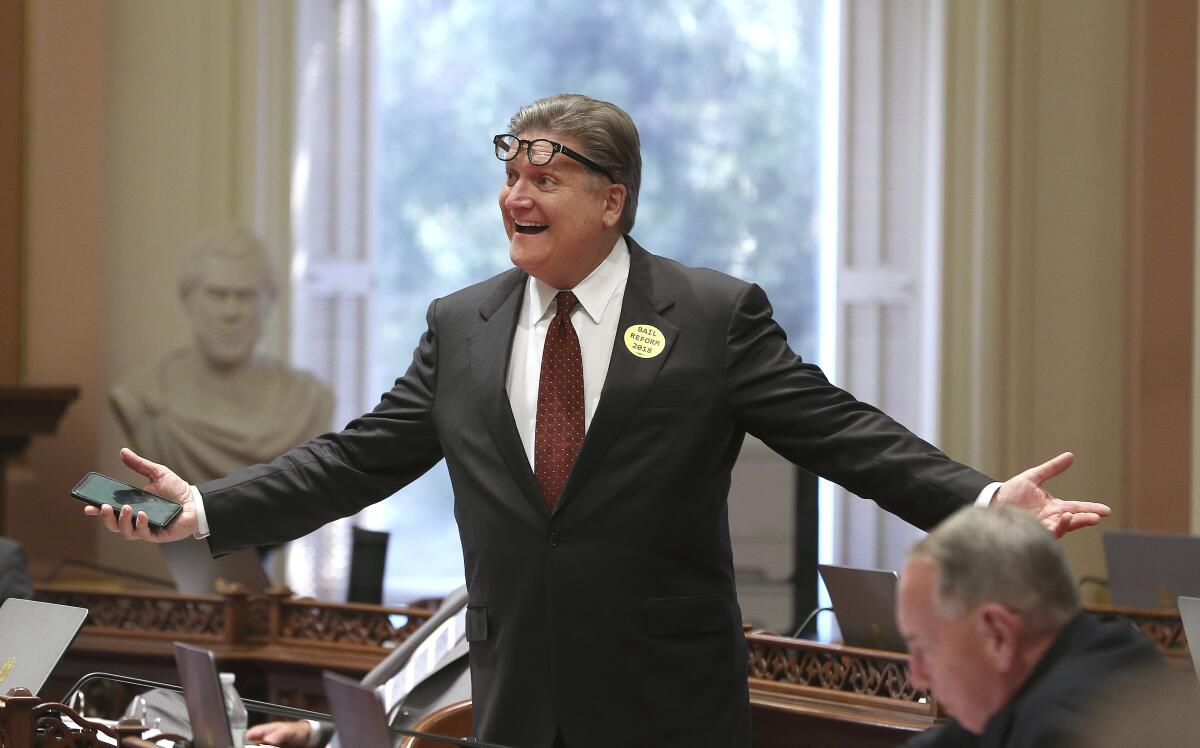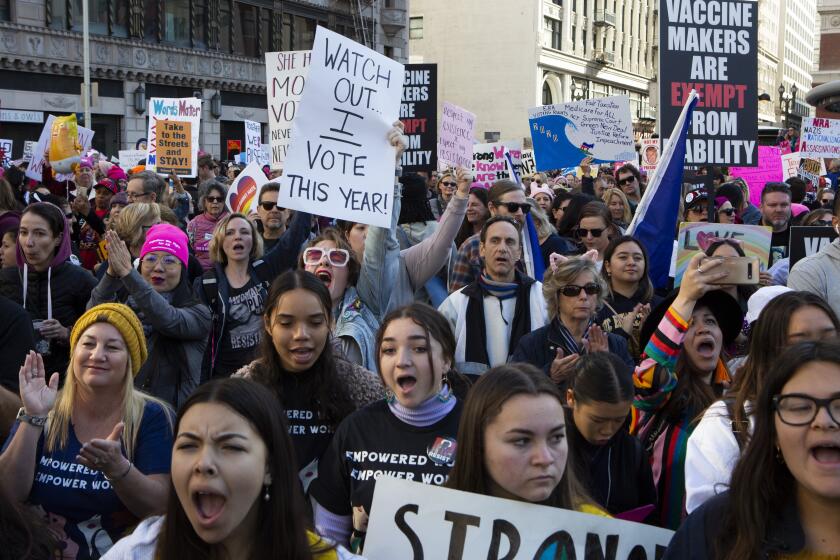Column: After decades in California politics, Bob Hertzberg is hanging it up. Too bad there are term limits

- Share via
SACRAMENTO — Bob Hertzberg should still be a state legislator. He’s a prime example of why term limits are boneheaded.
Yes, it’s true that term limits rid California’s Capitol of some sorry political specimens. Fresh blood is infused, and that’s good. But they also boot out productive lawmakers who are valuable because of their dedication, legislative know-how and acquired knowledge.
Lawmakers like Hertzberg, a Van Nuys Democrat who was recently termed out after serving eight years in the Senate and, a decade earlier, six in the Assembly, where he was a successful speaker for two years.
What losing good lawmakers like Hertzberg does is create power vacuums that are filled by special interests. Because newer legislators are inexperienced and less sure of themselves, term limits have shifted more influence to interest groups — labor and business in particular — and enhanced the governor’s clout.
Voters should decide how long an elected official represents them — not some one-size-fits-all formula.
At least voters agreed in 2012 to relax term limits by allowing legislators to serve 12 years in one house, not just six in the Assembly and eight in the Senate.
But I’ve gone off on a rant here and didn’t mean to. This column really is about Hertzberg.
A lifelong political junkie who loves public office for the right reasons — the joy and challenge of trying to make government work better for the citizenry — Hertzberg ran for a seat on the Los Angeles County Board of Supervisors.
He narrowly lost in November to Lindsey Horvath, a West Hollywood City Council member. Don’t read this wrong: I’m not saying he should have won. I didn’t watch the race. Horvath obviously was a good candidate.
She’s 40 and now the only millennial on the board. He’s 68 and an old buzzard. Perhaps his political shelf life had expired. It also was a good year for female candidates across the state.
“It was throw the bums out and get new people in,” Hertzberg told me.
A new class of California lawmakers will include more women than ever before
That mood was exacerbated by the leaked infamous recording of a racism-filled conversation between three L.A. City Council members discussing how to enhance their political status, Hertzberg said.
“It basically turned people off of politics.”
What I do know about is the rest of Hertzberg’s political career, from start to presumed finish.
He has always been intriguing to me, partly because I was largely responsible for his first significant political job.
I’d just gone to work for The Times in 1974 and was assigned to write about the contest for the Democratic lieutenant governor nomination. State Sen. Mervyn Dymally of Los Angeles was a candidate. When Dymally heard that a Times reporter was going to follow him around for a couple of days, he realized that a trip coordinator and driver was needed. He recruited Hertzberg, then a 19-year-old UCLA student.
Hertzberg had gotten hooked on politics a few months earlier when his attorney dad took him to a Dymally event where the featured speaker was former Vice President Hubert Humphrey. The next day, Hertzberg volunteered to organize college students for several Democratic candidates.
Hertzberg did such a good job organizing and driving that Dymally hired him for the entire campaign at $400 a month.
I covered Dymally on another campaign tour in the fall along the rugged North Coast. Hertzberg still can recite a couple of sentences I wrote: “Three logs burning in the huge fireplace of a fog-shrouded grand old hotel, the Eureka Inn … a trusty young political aide, a reporter … and the candidate.”
I bought the kid dinner.
Dymally was elected lieutenant governor, the first and only Black candidate to have won that office.
That campaign was an invaluable learning experience for the then-teenage Hertzberg.
“We went to all 58 counties,” he recalled years later. “No cellphones in the car. I got an opportunity to talk and listen to Dymally and the people who rode with us. And I was in the room during meetings. I really learned. I didn’t know what I was learning at the time, but it all became clear to me later. ... I learned about listening and not taking people for granted.”
Hertzberg later did advance work for President Carter and got a law degree. In 1996, he was elected to the Assembly and became an energizer bunny in the Capitol, a perpetual caffeinated workaholic. If he had a fault, it was trying to do too many things rather than focusing on a few.
He was a constant reformer, but one who believed the best approach was a single step at a time so as not to scare people.
“The secret to reforming,” he once told me, “is understanding incrementalism and not trying to be so big and so bold. You’ve got to align interests.”
One reform he championed — opposing most Democratic politicians — was independent redistricting of legislative and congressional districts, eliminating the crass practice of gerrymandering. He also helped create a legislative tool for compromising on ballot initiatives to spare voters from having to decide on them.
He tried for years to reform California’s volatile tax system but could never devise a winnable formula. That’s mainly because most politicians are scared of the subject.
He was considered a business moderate — like many Californians, a liberal on social issues but a centrist on fiscal matters.
The Democrat wishes Republicans were more relevant in the Capitol.
“I think having a two-party system is healthy,” he says. “They have a right to have a voice.”
He worries that virtually all major bills these days are written by special interests and handed to legislators to introduce.
“It’s so brazen,” he says.
But he loves it all. “I’m an institutionalist.”
It’s too bad he was termed out.
More to Read
Sign up for Essential California
The most important California stories and recommendations in your inbox every morning.
You may occasionally receive promotional content from the Los Angeles Times.












